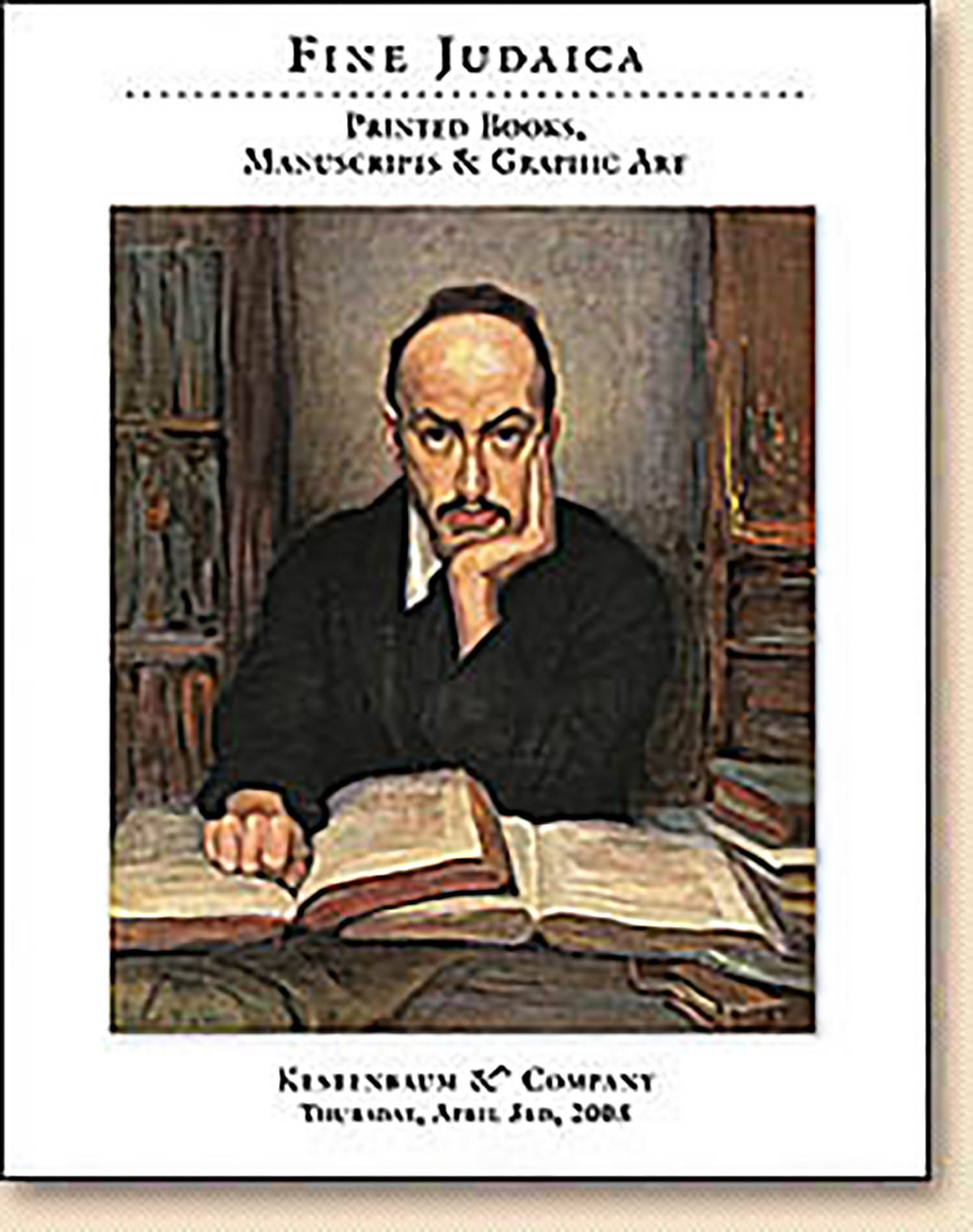Pinkas Mattersdorf. A commentary to Torah Parshath Eikev, Re'eh, Shoftim and Ki Setzei, together with commentary to the Haftorahs of Eikev and Shoftim. Portions unpublished

AUCTION 39 |
Thursday, April 03rd,
2008 at 1:00
Fine Judaica: Printed Books, Manuscripts, Autograph Letters & Graphic Art
Lot 348
SOFER, MOSES (CHATHAM SOFER).
Pinkas Mattersdorf. A commentary to Torah Parshath Eikev, Re'eh, Shoftim and Ki Setzei, together with commentary to the Haftorahs of Eikev and Shoftim. Portions unpublished
Mattersdorf : (1799)
Est: $150,000 - $200,000
THE EARLIEST DATED AGGADIC MANUSCRIPT ON TORAH WRITTEN BY THE CHATHAM SOFER.
PROVENANCE:
1. Rabbi Moses Sofer (1762-1839)
2.To his son, R. Shimon Sofer of Cracow (Author of Michtav Sofer).
3.To his son, R. Shlomo Alexandri Sofer (Author of Chut HaMeshulash and Igroth Soferim).
4.To his son-in-law, R. Joseph Naphtali Stern (Editor of Derashoth HaChatham Sofer and Chatham Sopher Al HaTorah); via his wife Raisele.
Rabbi Moses Sofer (1762-1839) of Mattersdorf and Pressburg was one of the most outstanding Rabbinic leaders of the late 18th-early 19th centuries. His responsa, novellae and sermons enjoyed unprecedented praise and respect and are to this day assiduously consulted by all Jews universally.
Rabbi Moses Sofer’s qualities of moral character, humanity, humility and justice, alongside his profound scholarship and leadership, has created some two centuries later, a deeply venerated aura surrounding his personality. Due to his considerable reputation, his legion of descendents (who proliferated into Europe’s most prominent Rabbinic families), deem original handwritten material by the Chatham Sofer to be imbued with an ineluctable level of holiness that serves as both a source of metaphysical protection and of blessing.
IMPORTANCE OF THIS MATTERSDORF PINKAS:
The aura of holiness noted above is especially true of the first six leaves of the present Mattersdorf manuscript which contains many kabbalistic interpretations and citations. Especially noteworthy, is his kabbalistic interpretation of the fourteen words contained in the Priestly Blessing and its' connection with the numerical equivalent of God's name. The Chatham Sofer prefaces this interpretation with the remark "Niglah Li" - (it has been revealed to me). A previous owner of this manuscript, the Chatham Sofer's grandson and biographer, R. Shlomo Alexandri Sofer, states in his authoritave biography Chut HaMeshulash (f. 27b, first footnote), that family tradition interprets this expression "Niglah Li" to mean that it was revealed to the Chatham Sofer by none other than Elijah the Prophet. Indeed the Chut HaMeshulash points to this exact passage in the present manuscript as a primary inication of this. The Chut HaMeshulash also relates that during this Mattersdorf period, the Chatham Sofer reached such a profound spiritual level that he no longer slept through the night and spent all hours studying Torah only whilst standing.
Also of note-worthy importance, the manuscript (f. 2a, second column, second paragraph and 2b, end of first column) cites commentaries in the name of my "Master the Gaon, Rabbi of Frankfurt a/Main," (i.e. R.Pinchos Horowiz, author of Hafla'ah).
R. Joseph Naphtali Stern, editor and publisher of many of the Chatham Sofer's works, writes a note pasted on the front cover of manuscript that this Pinkas Mattersdorf was held in particularly high esteem by the Chatham Sofer's son R. Shimon Sofer, who never let it out of his hands, constantly consulting it in order to receive inspiration. Stern also cites the words of R.Mordechai Bannet that gazing at the handwriting of the Chatham Sofer is a "segulah" to help the onlooker gain fear of God.
The Chatham Sofer had a habit in his writings (as seen here) of adding a dot superimposed over a dash after many paragraphs. In his introduction to Derashoth HaChatham Sofer, Stern cites the opinion of a kabbalistic scholar that this was likely based upon the words of the Baal Shem Tov (and cited by his grandson in Degel Machaneh Ephraim Parsha Vayechi), that "one of the secrets of the Torah is based upon the hidden aspects of Menasheh - the dash and of Ephraim- the dot."
See Shlomo Alexandri Sofer, Chut Ha-Meshulash (Munkatch, 1894); Joseph Naphtali Stern, Derashoth HaChatham Sofer (Klausenberg, 1929) and Chatham Sopher Al Ha-orah (introductions).
* Accompanied by an eleven-page study describing the contents and great importance of this manuscript
